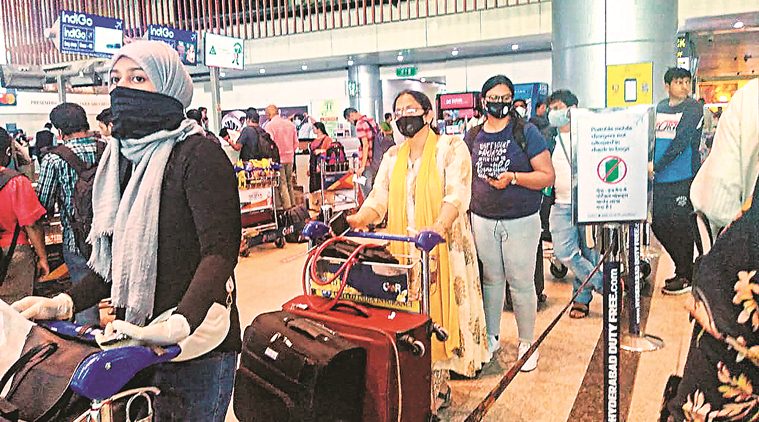Children to call drops: IT staff juggle work, home
The other problem of work-from-home is shaky technology — including slow Internet, systems that can’t take the load and call drops.
 At Hyderabad airport. (PTI)
At Hyderabad airport. (PTI)
IT firms are facing a logistical nightmare as more than 50 per cent of their employees work from home as part of measures to contain COVID-19. The biggest challenge is ensuring data security and data privacy, meeting project deadlines, ensuring productivity does not go down, and coordination among large teams.
Raising concerns over fall in revenues, a manager at one of the IT firms in Hyderabad said, “The atmosphere at home may not always be conducive for work. Not everyone has a quiet study or a corner desk. Schools are shut, so children are home as well. Some employees end up taking longer breaks or do not finish tasks as quickly as they might do while in office. When productivity goes down, deadlines have to be extended.”
Mansi S in Bengaluru has put a poster on her bedroom door, saying, ‘Knock before coming in — Dad’s rules’. A senior manager at a leading IT company, who has been working from home for a week now, she set her two eight-year-old daughters the task of making posters before logging in to work on Wednesday. “I took them aside and told them that I need their support, that we (her husband is also at home) might not be able to pay them attention sometimes. I try and set them a timetable for the day and relax a few rules,” she said.
With her firm mandating work from home for the first time, Mansi said she didn’t think it had led to any difference in productivity. “Some teams are, in fact, saddled with more responsibilities because we have to ensure that everything is up and running.”
While companies are doing video-conferencing and holding meetings online, the problem is not all projects can be taken home. Said an official, “In large projects, clients are not sending data any longer. These are getting delayed.”
B V R Mohan Reddy, the Executive Chairman of Cyient which has facilities in Hyderabad, Warangal and Visakhapatnam, said clients are understanding but have security considerations. “Customers expect us to build firewalls. In cases where we directly access the database of our customers, it might not be feasible for people to work from home and access those databases,” Reddy said.
Coordination is also proving an issue. “We all work as teams. At office, if there is a problem, I can just walk to a colleague’s desk or my supervisor will help me out. Now you have to send an email or explain over phone, and it takes time,” Reddy added.
Anindita Dutta, Project Manager at Wipro’s Bangalore office, who has seven teams and 40 people under her, begins her workday at 8 am, starting with calls to colleagues for coordination. “Things that I could have done by simply calling a quick meeting in office now take several phone calls. I have been on the phone almost the whole day,” she said.
However, she pointed out that while for managers, this makes working slightly harder, my team members are actually happy that they don’t have to travel for work”. Dutta, for one, also manages her six-year-old daughter, who too is at home with daycare facilities shut.
The other problem of work-from-home is shaky technology — including slow Internet, systems that can’t take the load and call drops. The manager of an IT major said, “Connecting to a client network using VPN is problematic. Connection may be lost…”
Said the director of another IT major, “Productivity is entirely dependent on high-speed Internet connection… Even if connectivity is sorted, some systems are highly secure and can be accessed only using an office network/LAN or VPN. Though most companies use tools like Skype/Teams/Viber/Zoom, the level of productivity achieved via co-located teams is way different.”
A veteran of the industry, Anil Nagenra called these times “unprecedented” for IT companies. “I haven’t seen this in 30 years of my experience. About two decades back, I was at IBM when we introduced monthly incentive of Rs 5,000 to encourage people to work from home. It completely failed,” said Nagendra, an advisor to several companies, and executive director at Enquero, a tech solutions firm.
That is why Mansi believes that the biggest possible outcome of the crisis could be a change in mindset. “Women especially end up seeking flexibility in work hours as a favour from office. I am hoping that in the future managers realise the need to be a little less judgmental. For example, not too many people will mind now if a child breaks into a meeting. So it shows we can take it in our stride, and still get the work done.”
Here’s a quick coronavirus guide for you to stay updated: Who all should be tested for Covid-19 and when? | How should you quarantine yourself? | How often (and how) should you clean your home? | What is the Janata Curfew announced by PM Modi? | Who are restricted from coming to India, and from when? | How long can the virus live on surfaces or in air around you? | Still more Coronavirus Q&A Explained news here



- 01
- 02
- 03
- 04
- 05




























